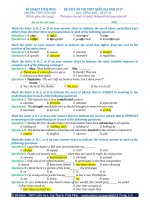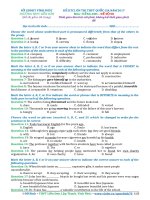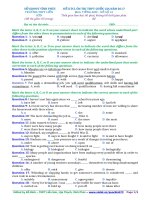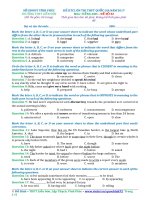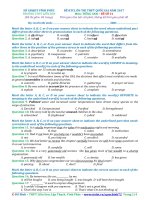DE LUYEN THI THPT QG 2017
Bạn đang xem bản rút gọn của tài liệu. Xem và tải ngay bản đầy đủ của tài liệu tại đây (88.44 KB, 8 trang )
<span class='text_page_counter'>(1)</span>SƠ GD&ĐT VINH PHUC TRƯƠNG THPT LIÊN SƠN (Đề thi gồm: 04 trang). ĐỀ KTCL ÔN THI THPT QUỐC GIA NĂM 2017 Môn: TIẾNG ANH – ĐÊ SỐ 35 Thời gian làm bài: 60 phút, không kể thời gian phát đề. Ho va tên thi sinh:……………………………………………………………………. SBD:………………………… Mark the letter A, B, C, or D on your answer sheet to indicate the word whose underlined part differs from the other three in pronunciation in each of the following questions. Question 1: A. psychology B. stomach C. machine D. cholera Question 2: A. mere B. deer C. hear D. bear Mark the letter A, B, C, or D on your answer sheet to indicate the word that differs from the other three in the position of primary stress in each of the following questions. Question 3: A. petrol B. penalty C. pedestrian D. document Question 4: A. refrigerator B. alphabetical C. dictionary D. magazine Mark the letter A, B, C, or D on your answer sheet to indicate the word(s) OPPOSITE in meaning to the underlined word(s) in each of the following questions. Question 5: Admittedly, the engineers’ report was relatively well-organized, but it was on the whole irrelevant. A. connected to what is being discussed B. preferentially chosen C. litererally composed D. clear and carefully informed Question 6: The police intervened in order to stop the riot. A. ignored B. patrolled C. attended D. cautioned Mark the letter A, B, C, or D on your answer sheet to indicate the underlined part that needs correction in each of the following questions. Question 7: When you come after class this afternoon, we’ll discuss about the possibility of your writing a research paper. A. your writing B. When C. after class D. ‘ll discuss about Question 8: Although Connecticut occupies a small area, its weather can vary from one area to others. A. its B. small C. others D. vary Mark the letter A, B, C, or D on your answer sheet to indicate the most suitable response to complete each of the following exchanges. Question 9: Q: “Has an announcement been made about the 8:00 flight to HCM City?” ~ R: “________” A. In 5 minutes. B. Soon. C. Gate 5 upstairs. D. Not yet. Question 10: Linda: “Mum is spending too much on her fashionable clothes.” ~ Tom: “_________” A. No wonder Dad has to do more part-time work. B. That’s why Dad goes to bed early. C. It’s a great pleasure. D. Great! I didn’t think she can make it well! Mark the letter A, B, C, or D on your answer sheet to indicate the word(s) CLOSEST in meaning to the underlined word(s) in each of the following questions. Question 11: As we waited on the pavement, a black Mercedes pulled up beside us. A. picked up B. ran over C. stopped running D. crashed down Question 12: Don’t rush to any conclusion before you know the full facts. A. move fast B. dismiss at once C. run quickly D. decide hastily Mark the letter A, B, C, or D on your answer sheet to indicate the correct answer to each of the following questions. Question 13: Several vehicles were involved in a________ due to a crash on Saigon Bridge. A. congestion B. stoppage C. pile-up D. jam.
<span class='text_page_counter'>(2)</span> Question 14: However irritating they are, you shouldn’t________ your temper with small children. A. lose B. fail C. drop D. miss Question 15: Mr. Duncan does not know…..the lawn mower after they had finished using it. A. where to put B. where they did put C. where did they put D. where they put Question 16: Tom never makes mistakes because he does his work so________. A. essentially B. meticulously C. superficially D. tactfully Question 17: Donald Trump________ that he had three Rolls-Royces at home. A. reminded B. informed C. threatened D. boasted Question 18: Rosa certainly________ her mother in her devil-may-care approach to life. A. looks after B. takes after C. calms down D. cares for th Question 19: If you aren’t sure what day the 24 is, look it up on the________. A. agenda B. diary C. calendar D. directory Question 20: I just love my present. I________ have wished for anything better. A. shouldn’t B. mustn’t C. couldn’t D. mightn’t Question 21: He claimed that he was not a remarkable businessman, but that he had simply had the good________ to be in the right place at the right time. A. opportunity B. fortune C. destiny D. fate Question 22: On returning home, Peter discovered________ his horror that the pipes had burst and the entire house was flooded. A. of B. by C. to D. at Question 23: Everyone thought he was asleep, but when they looked closely at him, his eyes were________. A. widely open B. opened wide C. opening widely D. wide open Question 24: My father is a(n)________ reader of science fiction novels. A. ardent B. fervent C. avid D. zealous Read the following passage and mark the letter A, B, C, or D on your answer sheet to indicate the correct answer to each of the questions. TIME FOR COFFEE The story of coffee drinking is one of the greatest and most fascinating in history. Millions of coffee drinkers worldwide cannot imagine life without a cup of aromatic coffee in the morning. Coffee is a natural stimulant which makes us feel more awake, alert and ready to concentrate. The qualities of mocca, as coffee was once known, were first discovered in Ethiopia more than one thousand years ago. However, it was not Africans but Turks and Arabs who actively encouraged coffee drinking. The habit of coffee drinking quickly spread throughout the Arab world, where coffee won a reputation as the wine of Islam. Coffee was first grown in Yemen. It was popular with Turks who served the drink to visiting Italian merchants. In 1615 traders from Venice brought coffee to Europe, where it was originally sold as a medicine. By the end of the sixteenth century coffee was drunk in major European cities from Paris to London. Now, around the world there are different methods of preparing coffee, for example, in Turkey coffee is traditionally boiled three times while Italians are the inventors of espresso and cappuccino. We drink coffee because of its aroma, taste and stimulating effect. However, extensive consumption of coffee may be harmful to our health, for instance, it may increase one's blood pressure or make one's heart beat irregularly. Fortunately, new brands of coffee have been appearing on the market recently. As they do not contain substances harmful to health, many people will not have to give up their coffee-drinking habits. Question 25: Coffee was discovered________. A. in Africa. B. in Europe. Question 26: Coffee was first grown________.. C. in Yemen. D. in Asia..
<span class='text_page_counter'>(3)</span> A. in Yemen. B. in Italy. C. in Turkey. D. in Africa. Question 27: Coffee drinking was popularized by________. A. the Italians. B. the Turks. C. the Ethiopians. D. the Africans. Question 28: New brands of coffee________. A. may influence our concentration ability. B. are as harmful as the original mocca. C. are less harmful than regular coffee. D. make people give up their coffee-drinking habits. Question 29: By the end of the sixteenth century people drank coffee________. A. in northern Europe. B. around the world C. in the most important European cities. D. in Paris and London only. Question 30: In Europe, coffee was popular as________. A. a natural stimulant. B. the wine of Islam. C. a soft drink. D. a medicine. Question 31: The word “for instance” in paragraph 5 can best be replaced by________. A. ready for use B. for example C. use right away D. for all users Read the following passage and mark the letter A, B, C, or D on your answer sheet to indicate the correct word or phrase that best fits each of the numbered blanks. MONEY Money is something we all take for granted in our lives. Some of us may (32)_______ we had more of it but we all recognize it when we see it, whether in the (33)_______ of coins, notes or cheques. It is difficult to imagine how people (34)_______ without money. In the earliest periods of human history, people used to exchange goods directly. They would exchanged goods they had (35)_______ of for things they were in need of. For example, they might offer food for tools. This (36)_______ of exchange, which is known as “barter”, has many disadvantages. Certain goods may be difficult to carry, they may not (37)_______ long, or may be impossible to divide into smaller units. It can also be very difficult to know the (38)_______ of something compared with other goods. According to historians, the first money, in the sense we understand it today, (39)_______ of gold coins produced about 2,500 years ago. Gold, being a very precious metal, was a (40)_______ material. The introduction of gold coins was acceptable to everyone and they were still being used at the beginning of this century, although they have been (41)_______ by paper money and coins made of ordinary metals. Question 32: A. desire Question 33: A. figure Question 34: A. arranged Question 35: A. amount Question 36: A. procedure Question 37: A. remain Question 38: A. worth Question 39: A. created Question 40: A. right Question 41: A. taken over. B. expect B. form B. spent B. plenty B. method B. continue B. rate B. developed B. correct B. put away. C. wish C. image C. dealt C. supply C. operation C. stay C. charge C. consisted C. just C. replaced. D. hope D. design D. managed D. sufficient D. business D. last D. level D. composed D. suitable D. reformed. Read the following passage and mark the letter A, B, C, or D on your answer sheet to indicate the correct answer to each of the questions. Today, in many parts of the world, it is customary for people to shake hands upon meeting as gesture of good will. Originally, however, the practice of shaking hands had more practical purpose. Shaking hands originated in medieval times. In those days, when a man came on a stranger, he would often automatically reach for his sword with his right hand, in case he had to use the weapon to defend himself. Sometimes, both parties found themselves circling around each other, weapons in hand, until it was mutually agreed that the weapons could be laid aside. Then, the two parties extended their right hands to show that they had no weapons, and clasped them. This was the beginning of the handshake..
<span class='text_page_counter'>(4)</span> The custom of shaking hands is not a universal one. In the Orient, people have, for centuries, clasped their own hands in front of them upon meeting to show that they held no weapons. In France, a custom developed in which people who met would kiss each other on both cheeks. The natives of some South Seas islands greet by rubbing noses. Question 42: The purpose of shaking hands was________. A. to show that the two parties had no weapons B. just a ceremony showing friendship C. a gesture of good will D. to show that both parties were ready for a fight Question 43: To show that one has no intention to fight________. A. the Oriental people kiss each other’s hand B. shaking hands has been practiced all over the world C. there have been various ways depending on different cultures D. people laid aside their weapons Question 44: The practice of shaking hands________. A. is considered not to be very polite B. is very popular in the world C. is being replaced by other customs D. used to be popular, but now it is out of date Question 45: The word “came on” in paragraph 2 can best be replaced by________. A. attacked B. happened to meet C. visited D. waited for Question 46: The word “universal” in paragraph 3 can best be replaced by________. A. briefly agreed B. largely accepted C. of the universe D. mainly expected Mark the letter A, B, C, or D on your answer sheet to indicate the sentence that is closest in meaning to each of the following questions. Question 47: They left early because they didn’t want to get caught in the traffic. A. They left early so that they not to get caught in the traffic. B. They left early to avoid getting caught in the traffic. C. They left early so as to not get caught in the traffic. D. They left early in order to not get caught in the traffic. Question 48: If only I had taken that job in the bank. A. I regret not taking that job in the bank. B. I regret not take that job in the bank. C. I wish I took that job in the bank. D. I wish I have taken that job in the bank Mark the letter A, B, C, or D on your answer sheet to indicate the sentence that best combines each pair of sentences in the following questions. Question 49: I lost my key. I had to wait in the dark for hours. A. If I hadn’t lost my key, I wouldn’t have to wait in the dark for hours. B. If I didn’t lose my key, I wouldn’t have to wait in the dark for hours. C. If I hadn’t lost my key, I wouldn’t have had to wait in the dark for hours. D. Having to wait in the dark for hours because I had lost my key. Question 50: I tried hard. I couldn’t open the door. A. It is difficult for me to open the door. B. Try as hard as I might, I couldn’t open the door. C. No matter how hard I tried, I couldn’t open the door. D. I could open the door with difficulty. ___________THE END____________.
<span class='text_page_counter'>(5)</span> SƠ GD&ĐT VINH PHUC TRƯƠNG THPT LIÊN SƠN (Đề thi gồm: 04 trang). ĐỀ KTCL ÔN THI THPT QUỐC GIA NĂM 2017 Môn: TIẾNG ANH – ĐÊ SỐ 35 Thời gian làm bài: 60 phút, không kể thời gian phát đề. Ho va tên thi sinh:……………………………………………………………………. SBD:………………………… Mark the letter A, B, C, or D on your answer sheet to indicate the word whose underlined part differs from the other three in pronunciation in each of the following questions. Question 1: A. psychology B. stomach C. machine D. cholera Question 2: A. mere B. deer C. hear D. bear Mark the letter A, B, C, or D on your answer sheet to indicate the word that differs from the other three in the position of primary stress in each of the following questions. Question 3: A. petrol B. penalty C. pedestrian D. document Question 4: A. refrigerator B. alphabetical C. dictionary D. magazine Mark the letter A, B, C, or D on your answer sheet to indicate the word(s) OPPOSITE in meaning to the underlined word(s) in each of the following questions. Question 5: Admittedly, the engineers’ report was relatively well-organized, but it was on the whole irrelevant. A. connected to what is being discussed B. preferentially chosen C. litererally composed D. clear and carefully informed Question 6: The police intervened in order to stop the riot. A. ignored B. patrolled C. attended D. cautioned Mark the letter A, B, C, or D on your answer sheet to indicate the underlined part that needs correction in each of the following questions. Question 7: When you come after class this afternoon, we’ll discuss about the possibility of your writing a research paper. A. your writing B. When C. after class D. ‘ll discuss about Question 8: Although Connecticut occupies a small area, its weather can vary from one area to others. A. its B. small C. others D. vary Mark the letter A, B, C, or D on your answer sheet to indicate the most suitable response to complete each of the following exchanges. Question 9: Q: “Has an announcement been made about the 8:00 flight to HCM City?” ~ R: “________” A. In 5 minutes. B. Soon. C. Gate 5 upstairs. D. Not yet. Question 10: Linda: “Mum is spending too much on her fashionable clothes.” ~ Tom: “_________” A. No wonder Dad has to do more part-time work. B. That’s why Dad goes to bed early. C. It’s a great pleasure. D. Great! I didn’t think she can make it well! Mark the letter A, B, C, or D on your answer sheet to indicate the word(s) CLOSEST in meaning to the underlined word(s) in each of the following questions. Question 11: As we waited on the pavement, a black Mercedes pulled up beside us. A. picked up B. ran over C. stopped running D. crashed down Question 12: Don’t rush to any conclusion before you know the full facts. A. move fast B. dismiss at once C. run quickly D. decide hastily Mark the letter A, B, C, or D on your answer sheet to indicate the correct answer to each of the following questions. Question 13: Several vehicles were involved in a________ due to a crash on Saigon Bridge. A. congestion B. stoppage C. pile-up D. jam.
<span class='text_page_counter'>(6)</span> Question 14: However irritating they are, you shouldn’t________ your temper with small children. A. lose B. fail C. drop D. miss Question 15: Mr. Duncan does not know…..the lawn mower after they had finished using it. A. where to put B. where they did put C. where did they put D. where they put Question 16: Tom never makes mistakes because he does his work so________. A. essentially B. meticulously C. superficially D. tactfully Question 17: Donald Trump________ that he had three Rolls-Royces at home. A. reminded B. informed C. threatened D. boasted Question 18: Rosa certainly________ her mother in her devil-may-care approach to life. A. looks after B. takes after C. calms down D. cares for th Question 19: If you aren’t sure what day the 24 is, look it up on the________. A. agenda B. diary C. calendar D. directory Question 20: I just love my present. I________ have wished for anything better. A. shouldn’t B. mustn’t C. couldn’t D. mightn’t Question 21: He claimed that he was not a remarkable businessman, but that he had simply had the good________ to be in the right place at the right time. A. opportunity B. fortune C. destiny D. fate Question 22: On returning home, Peter discovered________ his horror that the pipes had burst and the entire house was flooded. A. of B. by C. to D. at Question 23: Everyone thought he was asleep, but when they looked closely at him, his eyes were________. A. widely open B. opened wide C. opening widely D. wide open Question 24: My father is a(n)________ reader of science fiction novels. A. ardent B. fervent C. avid D. zealous Read the following passage and mark the letter A, B, C, or D on your answer sheet to indicate the correct answer to each of the questions. TIME FOR COFFEE The story of coffee drinking is one of the greatest and most fascinating in history. Millions of coffee drinkers worldwide cannot imagine life without a cup of aromatic coffee in the morning. Coffee is a natural stimulant which makes us feel more awake, alert and ready to concentrate. The qualities of mocca, as coffee was once known, were first discovered in Ethiopia more than one thousand years ago. However, it was not Africans but Turks and Arabs who actively encouraged coffee drinking. The habit of coffee drinking quickly spread throughout the Arab world, where coffee won a reputation as the wine of Islam. Coffee was first grown in Yemen. It was popular with Turks who served the drink to visiting Italian merchants. In 1615 traders from Venice brought coffee to Europe, where it was originally sold as a medicine. By the end of the sixteenth century coffee was drunk in major European cities from Paris to London. Now, around the world there are different methods of preparing coffee, for example, in Turkey coffee is traditionally boiled three times while Italians are the inventors of espresso and cappuccino. We drink coffee because of its aroma, taste and stimulating effect. However, extensive consumption of coffee may be harmful to our health, for instance, it may increase one's blood pressure or make one's heart beat irregularly. Fortunately, new brands of coffee have been appearing on the market recently. As they do not contain substances harmful to health, many people will not have to give up their coffee-drinking habits. Question 25: Coffee was discovered________. A. in Africa. B. in Europe. Question 26: Coffee was first grown________.. C. in Yemen. D. in Asia..
<span class='text_page_counter'>(7)</span> A. in Yemen. B. in Italy. C. in Turkey. D. in Africa. Question 27: Coffee drinking was popularized by________. A. the Italians. B. the Turks. C. the Ethiopians. D. the Africans. Question 28: New brands of coffee________. A. may influence our concentration ability. B. are as harmful as the original mocca. C. are less harmful than regular coffee. D. make people give up their coffee-drinking habits. Question 29: By the end of the sixteenth century people drank coffee________. A. in northern Europe. B. around the world C. in the most important European cities. D. in Paris and London only. Question 30: In Europe, coffee was popular as________. A. a natural stimulant. B. the wine of Islam. C. a soft drink. D. a medicine. Question 31: The word “for instance” in paragraph 5 can best be replaced by________. A. ready for use B. for example C. use right away D. for all users Read the following passage and mark the letter A, B, C, or D on your answer sheet to indicate the correct word or phrase that best fits each of the numbered blanks. MONEY Money is something we all take for granted in our lives. Some of us may (32)_______ we had more of it but we all recognize it when we see it, whether in the (33)_______ of coins, notes or cheques. It is difficult to imagine how people (34)_______ without money. In the earliest periods of human history, people used to exchange goods directly. They would exchanged goods they had (35)_______ of for things they were in need of. For example, they might offer food for tools. This (36)_______ of exchange, which is known as “barter”, has many disadvantages. Certain goods may be difficult to carry, they may not (37)_______ long, or may be impossible to divide into smaller units. It can also be very difficult to know the (38)_______ of something compared with other goods. According to historians, the first money, in the sense we understand it today, (39)_______ of gold coins produced about 2,500 years ago. Gold, being a very precious metal, was a (40)_______ material. The introduction of gold coins was acceptable to everyone and they were still being used at the beginning of this century, although they have been (41)_______ by paper money and coins made of ordinary metals. Question 32: A. desire Question 33: A. figure Question 34: A. arranged Question 35: A. amount Question 36: A. procedure Question 37: A. remain Question 38: A. worth Question 39: A. created Question 40: A. right Question 41: A. taken over. B. expect B. form B. spent B. plenty B. method B. continue B. rate B. developed B. correct B. put away. C. wish C. image C. dealt C. supply C. operation C. stay C. charge C. consisted C. just C. replaced. D. hope D. design D. managed D. sufficient D. business D. last D. level D. composed D. suitable D. reformed. Read the following passage and mark the letter A, B, C, or D on your answer sheet to indicate the correct answer to each of the questions. Today, in many parts of the world, it is customary for people to shake hands upon meeting as gesture of good will. Originally, however, the practice of shaking hands had more practical purpose. Shaking hands originated in medieval times. In those days, when a man came on a stranger, he would often automatically reach for his sword with his right hand, in case he had to use the weapon to defend himself. Sometimes, both parties found themselves circling around each other, weapons in hand, until it was mutually agreed that the weapons could be laid aside. Then, the two parties extended their right hands to show that they had no weapons, and clasped them. This was the beginning of the handshake..
<span class='text_page_counter'>(8)</span> The custom of shaking hands is not a universal one. In the Orient, people have, for centuries, clasped their own hands in front of them upon meeting to show that they held no weapons. In France, a custom developed in which people who met would kiss each other on both cheeks. The natives of some South Seas islands greet by rubbing noses. Question 42: The purpose of shaking hands was________. A. to show that the two parties had no weapons B. just a ceremony showing friendship C. a gesture of good will D. to show that both parties were ready for a fight Question 43: To show that one has no intention to fight________. A. the Oriental people kiss each other’s hand B. shaking hands has been practiced all over the world C. there have been various ways depending on different cultures D. people laid aside their weapons Question 44: The practice of shaking hands________. A. is considered not to be very polite B. is very popular in the world C. is being replaced by other customs D. used to be popular, but now it is out of date Question 45: The word “came on” in paragraph 2 can best be replaced by________. A. attacked B. happened to meet C. visited D. waited for Question 46: The word “universal” in paragraph 3 can best be replaced by________. A. briefly agreed B. largely accepted C. of the universe D. mainly expected Mark the letter A, B, C, or D on your answer sheet to indicate the sentence that is closest in meaning to each of the following questions. Question 47: They left early because they didn’t want to get caught in the traffic. A. They left early so that they not to get caught in the traffic. B. They left early to avoid getting caught in the traffic. C. They left early so as to not get caught in the traffic. D. They left early in order to not get caught in the traffic. Question 48: If only I had taken that job in the bank. A. I regret not taking that job in the bank. B. I regret not take that job in the bank. C. I wish I took that job in the bank. D. I wish I have taken that job in the bank Mark the letter A, B, C, or D on your answer sheet to indicate the sentence that best combines each pair of sentences in the following questions. Question 49: I lost my key. I had to wait in the dark for hours. A. If I hadn’t lost my key, I wouldn’t have to wait in the dark for hours. B. If I didn’t lose my key, I wouldn’t have to wait in the dark for hours. C. If I hadn’t lost my key, I wouldn’t have had to wait in the dark for hours. D. Having to wait in the dark for hours because I had lost my key. Question 50: I tried hard. I couldn’t open the door. A. It is difficult for me to open the door. B. Try as hard as I might, I couldn’t open the door. C. No matter how hard I tried, I couldn’t open the door. D. I could open the door with difficulty. ___________THE END____________.
<span class='text_page_counter'>(9)</span>


